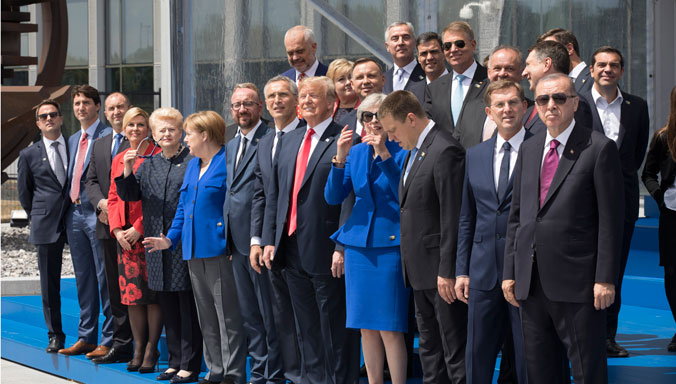Focus On What You Do For NATO, Europe, Not The $$
Posted on

As feared, President Donald Trump came out swinging at the NATO summit. He castigated Germany for being subservient to Russia (guess he forgot about his idea to welcome Russia back to the G-7) and continued his focus on getting Europe to spend more on defense. Given the political environment, we welcome these constructive suggestions for how Europe can improve what it contributes to NATO’s defense, authored by CSIS’s newly-minted expert on the alliance, Michael Matlaga. Read on! The Editor.
If NATO heads of state want to avoid another unproductive back and forth like the recent G-7 meeting, they need to shift the conversation to concrete initiatives and policies that demonstrate commitment and sacrifice from Europe and Canada — outputs — and not get sidetracked into futile discussions about inputs (cash). Here are three ideas to steer the conversation in productive ways.
Focus on improving pre-crisis and wartime military mobility. Because of red tape, it just takes too long to get forces where they need to be. Ben Hodges, the former U.S. Army commander in Europe, campaigned to add the issue to the summit agenda. The EU’s Permanent Structured Cooperation in defense has made mobility that compliments NATO’s needs a top priority. European heads of state should lead the discussion on ways to reduce pre-crisis diplomatic clearance times for movement of troops, equipment and supplies on the ground and in the air. Not only is Europe uniquely capable of making the necessary reforms, but it is an area where even crucial NATO allies like France—which requires 60 days of diplomatic clearance time in a pre-crisis state—have dramatically underdelivered. Additionally, members must decide on a specific policy for how an Article V declaration would clear legal and diplomatic hurdles to mobility; once the shooting starts, how will the Europeans eliminate the peacetime red tape.

Aegis Ashore launch
NATO’s European members should discuss how to increase investment in their own Ballistic Missile Defense (BMD) capabilities by building on the European Phased Adaptive Approach (EPAA) for European BMD. Russia threatens the alliance with a variety of missiles and Europe is nearly without ownership of its defenses against them. The EPAA approach to regional BMD, implemented during the first Obama Administration, deployed the Aegis system to Europe in the form of (American) BMD-capable Aegis ships, a land-based radar, and two Aegis Ashore sites in Poland and Romania. In order to take more responsibility for missile defense in Europe, members might discuss building Aegis-capable destroyers and cruisers (perhaps domestically under license), upgrading existing ships, or purchasing Aegis Ashore. Purchasing American systems like the Aegis air defense system would improve NATO interoperability and collective security while also helping members meet the 2 percent defense spending and 20 percent equipment spending targets.
Finally, Macron, Merkel, and other wary European heads of state should discuss further implementation of the Four 30s, NATO’s plan to deploy 30 battalions, 30 squadrons of fighter aircraft and 30 warships within 30 days to deter and defend against Russian aggression. Making implementation of the Four 30s a Europe-driven initiative could go a long way to meeting real world operational demands and moving the conversation away from budgets, or at least demonstrating that Europeans are focused on defense.
President Trump has kept hammering away at burden sharing and the progress of below-the-mark members. European leaders should, of course, clearly restate their intentions to uphold these commitments (which don’t come due til 2024), and they can point to modest progress. Recently released NATO data shows that eight members will spend above 2 percent on defense this year, up from four last year. NATO Secretary General Jens Stoltenberg also came out in support of members’ efforts to meet their commitments, stating in a Wall Street Journal op-ed that the “pledge [to move toward spending 2 percent on defense] is being kept.”
Even though it is true, this is a losing argument for the Europeans. They should work to keep the focus of the summit on substantive defense policy initiatives. Focusing on broadly agreed-upon challenges and deficiencies like mobility, missile and air defense, and readiness would not only avoid two days of recriminations but would also actually help meet the alliance’s core interest of collective security.
Subscribe to our newsletter
Promotions, new products and sales. Directly to your inbox.
